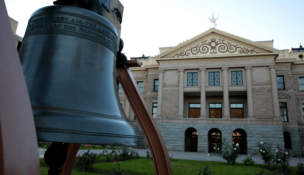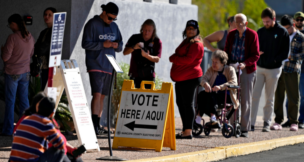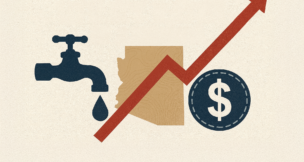Pollster explains how Democrats went wrong
Howard Fischer, Capitol Media Services//December 16, 2024//
Pollster explains how Democrats went wrong
Howard Fischer, Capitol Media Services//December 16, 2024//
Pollster Mike Noble says he knows why Democrats in Arizona generally did so poorly in the last election: The political independents who make up more than a third of registered voters weren’t interested in what the Democrats were selling.
A new survey found that 31% of independents listed the economy as one of the top three issues in deciding for whom they would vote. That aligns perfectly with the priorities of registered Republicans.
And Democrats? At the top of their list was threats to the economy as 27%
The economy? It was in the top three for just 18% of Democrats.

But the disparities don’t stop there.
The No. 3 issue for Democrats in deciding for whom to vote was abortion. That rated among the top three for just 11% of independents and 6% of Republicans.
And just 6% of Democrats considered immigration among their top issues.
Noble said all that came home to roost when Arizonans went to the polls last month. And while much of the focus was at the top of the ticket, he said the effects trickled down the ballot to more local races.
“They were focused on what mattered to Arizonans – especially “those all-important independent voters,” Noble said.
“They were more spot-on compared to Democrats who were a bit more in la-la land when it came to issues they were talking about,” he continued. And Noble said that was particularly true on the question of abortion, which, while a key priority of Democrats, proved less significant among the rest of voters than the issues of immigration and the economy, the ones being promoted by Donald Trump.
“And, frankly, independents trusted Republicans better on those issues than Democrats,” he said.
Yet even in a year where Trump won in Arizona and Republicans picked up seats in the state House and Senate, there was an outlier: Democrat Ruben Gallego defeated Republican Kari Lake by 80,000 votes in the race for the U.S. Senate.
Some Lake supporters have cried “foul,” arguing there is no way that Gallego gained 93,000 more votes among Arizonans than Kamala Harris. Noble, however, said there are reasons for that, including what he called a “like-ability” factor: Gallego was viewed positively by 53% of those questioned in the new survey versus Lake at just 37%.
But what really made a difference, Noble said, is that as much as Lake tried to paint Gallego as a Biden-Harris sycophant, he was doing his best to show Arizonans a different face.
“Ruben, I think, did a pretty good job of distancing himself for making different decisions than Democrats as a whole,” Noble said. And not just on big issues.
For example, he noted that Gallego banned his congressional staff from using the term “Latinx,” something Noble said is “part of that social-identification politics, which is smart to do.”
Gallego made his position clear in a social media post.
“When Latino politicos use the term it is largely to appease white rich progressive who think that is the term we use,” he wrote during the campaign. “It is a vicious circle of confirmation bias.”
At the same time, Noble wrote, there were “twists and changes” within the Democratic Party itself. And that, he said, placed Gallego more in a centrist position, “more palatable to voters” and not coming off as out-of-touch.
The flip side of all this, said Noble, is that when Democrats are looking for lessons of what went wrong – and what not to do next time – they should not be focused on what Harris and many other Democrats did.
“Look at what Ruben Gallego did, and, previous to that, Mark Kelly, and, previous to that, Kirsten Sinema,” he said. “That is what you should be doing if you want to be successful in Arizona.”
The same survey found that 46% of those rated Democratic Gov. Katie Hobbs as favorable against 41% who had an unfavorable impression of her.
Noble, however, said it probably is less of a reflection on her – she was not up for election this year – and more on the impression of voters about Democrats as a whole. And, that, in turn, goes to the fact 2024 was a presidential election year, with what happens at the top having a lot of down-ticket effect.
“They just had better messaging on the right issues,” he said of Republicans. And Noble said that was particularly true on the issue of immigration.
“That was kind of Trump’s signature issue,” he said, more-so in a border state like Arizona than it was elsewhere.
Still, if Democrats lost because they were more focused on things like abortion than immigration, how did Proposition 139, which put the right to an abortion into the state Constitution, manage to get the votes of more than 61% of Arizonans?
Noble said there’s nothing inconsistent about that. He said voters differentiated between the political campaigns of the candidates and the ballot issues.
“A perfect example of this is that we saw voters voting for Trump, for Gallego – and yes on abortion,” he said.
In Arizona, that is not unique.
Voters in Missouri and Montana both amended their state constitutions to enshrine the right of abortion until fetal viability, generally considered between 22 and 24 weeks. Yet Trump won both states, and by an even larger margin of victory than Arizona.
Trump also won in Nevada where a similar abortion measure was approved, though voters in that state now have to ratify the change in 2026.
The survey of 988 registered voters was conducted from Nov. 20 through 25 and is considered to have a margin of error of 3.1%.










































